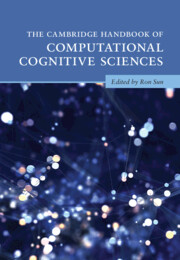Book contents
- The Cambridge Handbook of Computational Cognitive Sciences
- Cambridge Handbooks in Psychology
- The Cambridge Handbook of Computational Cognitive Sciences
- Copyright page
- Contents
- Preface
- Contributors
- Part I Introduction
- Part II Cognitive Modeling Paradigms
- 2 Connectionist Models of Cognition
- 3 Bayesian Models of Cognition
- 4 Symbolic and Hybrid Models of Cognition
- 5 Logic-Based Modeling of Cognition
- 6 Dynamical Systems Approaches to Cognition
- 7 Quantum Models of Cognition
- 8 Constraints in Cognitive Architectures
- 9 Deep Learning
- 10 Reinforcement Learning
- Part III Computational Modeling of Basic Cognitive Functionalities
- Part IV Computational Modeling in Various Cognitive Fields
- Part V General Discussion
- Index
- References
3 - Bayesian Models of Cognition
from Part II - Cognitive Modeling Paradigms
Published online by Cambridge University Press: 21 April 2023
- The Cambridge Handbook of Computational Cognitive Sciences
- Cambridge Handbooks in Psychology
- The Cambridge Handbook of Computational Cognitive Sciences
- Copyright page
- Contents
- Preface
- Contributors
- Part I Introduction
- Part II Cognitive Modeling Paradigms
- 2 Connectionist Models of Cognition
- 3 Bayesian Models of Cognition
- 4 Symbolic and Hybrid Models of Cognition
- 5 Logic-Based Modeling of Cognition
- 6 Dynamical Systems Approaches to Cognition
- 7 Quantum Models of Cognition
- 8 Constraints in Cognitive Architectures
- 9 Deep Learning
- 10 Reinforcement Learning
- Part III Computational Modeling of Basic Cognitive Functionalities
- Part IV Computational Modeling in Various Cognitive Fields
- Part V General Discussion
- Index
- References
Summary
Many of the problems that human minds need to solve – including learning concepts, causal relationships, and languages – require making informed inferences from limited data. Bayesian models of cognition consider how an ideal agent should solve these problems, drawing on ideas from probability theory, statistics, machine learning, and artificial intelligence. The resulting models can then be used to understand human behavior, identifying in formal terms the knowledge that human minds draw on when solving these problems and identifying potential mechanisms by which their solutions might be implemented. This chapter provides an introduction to Bayesian models of cognition, starting with the basic principles of probability theory and then considering more advanced topics such as graphical models, causal learning, hierarchical Bayesian models, and Markov chain Monte Carlo. The chapter ends with a brief review of recent theoretical developments.
Information
- Type
- Chapter
- Information
- The Cambridge Handbook of Computational Cognitive Sciences , pp. 80 - 138Publisher: Cambridge University PressPrint publication year: 2023
References
Accessibility standard: Unknown
Why this information is here
This section outlines the accessibility features of this content - including support for screen readers, full keyboard navigation and high-contrast display options. This may not be relevant for you.Accessibility Information
- 3
- Cited by
